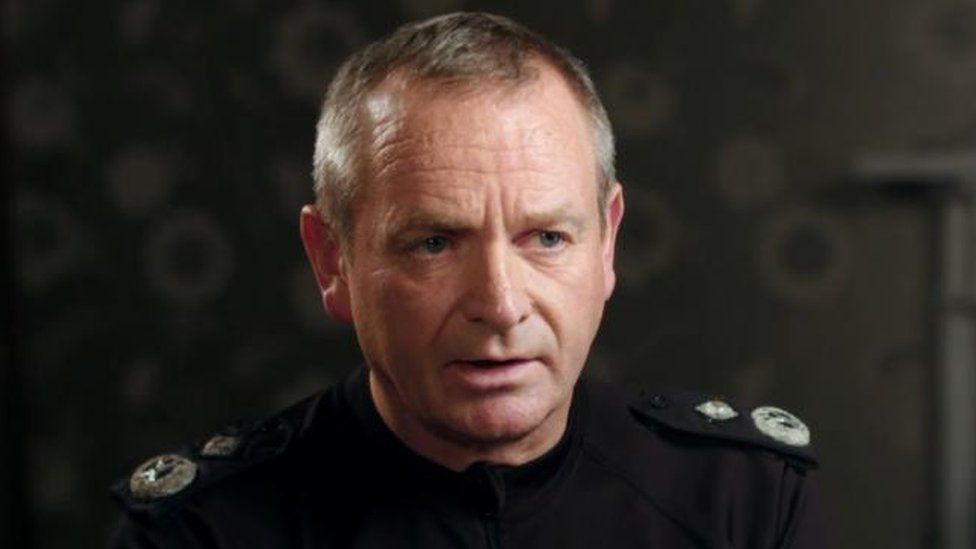The police chief who stayed on to take the top job
- Published

Just a year before Iain Livingstone took over as Police Scotland chief constable he had been preparing to take early retirement.
Instead he was catapulted into the top job by the resignation of Phil Gormley in 2017.
His five years at the top of Scottish policing have been a tough and bruising experience and the 56-year-old has now announced he will retire after 31 years in the force.
Sir Iain, who was knighted in June 2022, was a popular choice to replace Mr Gormley, who had no experience of policing in Scotland.
In fact, Sir Iain had been widely regarded as the first choice to get the job in 2015 when Sir Stephen House resigned amid a series of controversies.
Despite the disappointment of missing out to Mr Gormley, he remained a key part of the executive team.
But in 2017, Sir Iain started to seriously consider life beyond the police and he was serving his notice when Mr Gormley's tenure began to unravel.
More than ever the force needed strong leadership and Sir Iain was asked to postpone his retirement.
After discussing it at length with his wife and family, he agreed to stay on.
Sir Iain's route into policing was unconventional.
He graduated in law from the Universities of Aberdeen and Strathclyde before working as a solicitor in Glasgow, Edinburgh and London.
But in 1992 he decided to change career and joined Lothian and Borders Police.
Sir Iain served in Edinburgh and West Lothian as a patrol officer and detective.
Despite his rapid rise through the ranks he once faced an allegation about his behaviour at the Scottish Police College in Tulliallan but was later exonerated.
Sir Iain, who studied in New York City as part of a Fulbright Scholarship, was later promoted to head of CID before being named assistant chief constable crime.
When Police Scotland replaced the old eight-force model in 2013, he was appointed deputy chief constable crime and operations.
He took on the chief constable role on an interim basis in September 2017 before being given the job permanently in August 2018, and is responsible for about 23,000 officers and civilian staff and an annual budget of more than £1bn.
His time in charge as seen a number of difficult periods.
Last year, Police Scotland had to pay out almost £1m in compensation to a former firearms officer who was victimised by "horrific" boys' club sexism in the force's elite armed response unit.
Sir Iain apologised to Rhona Malone, who quit the force's firearms unit in Edinburgh where misogynistic abuse and bullying were rife.
More recently it was revealed that 47 police officers in Scotland had resigned or retired during misconduct proceedings against them since 2019.
There have also been wrangles over funding with Police Scotland warning it may have to suspend its 101 non-emergency phone line and lose thousands of officers and staff under government spending plans.
The high-profile public inquiry into the death of Sheku Bayoh in police custody has been running since May last year.
The death occurred before Sir Iain took the top job but Mr Bayoh's family have raised allegations of institutional racism within Police Scotland.
One of the biggest tasks of his time as chief constable was responsibility for the COP26 climate summit in Glasgow in November 2021 - one of the largest police operations ever mounted in Scotland.
More than 7,000 police officers and staff from across the UK were under his ultimate command as world leaders arrived in the city for a massive operation that was described as "safe and secure".
Sir Iain was also praised for the role Police Scotland played through Covid and the events following the death of Queen Elizabeth.
He has now decided he will take up the retirement he first considered more than five years ago.
Sir Iain will hand over the reins to the UK's second-largest police force in August.
Related Topics
- Published23 June 2022
- Published15 August 2018
- Published26 June 2018
- Published29 May 2018
- Published1 April 2018
- Published8 February 2018
- Published7 February 2018
- Published7 February 2018
- Published7 February 2018
- Published2 December 2015
- Published27 August 2015